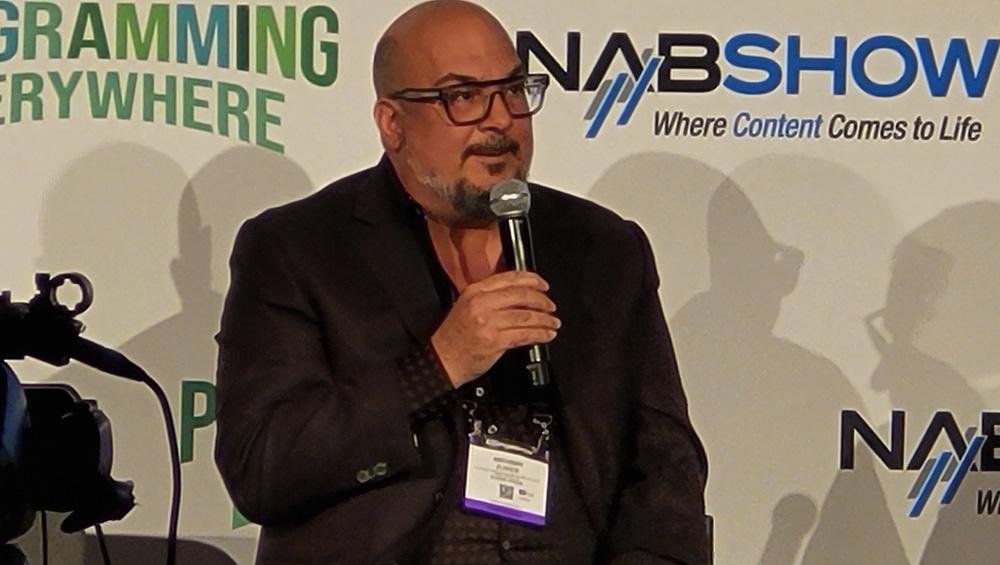
For Anthony Zuiker, Passion Is Key To Broadcasting Success

LAS VEGAS — For CSI creator Anthony Zuiker, success in broadcast requires a return to loving television.
That means emotional content that connects with the audience, less disruption in the viewing experience, and taking full advantage of the video a station shoots, he said in the session “Creating New Shows that Break the Mold” during TVNewsCheck’s Programming Everywhere event on April 16 of the NAB Show.
Zuiker, who created the CBS franchise of CSI, is also the co-founder, publisher and creative director of Zuiker Press.
His litmus test for whether television is good is whether he feels it in his heart and mind, and whether it raises the hairs on the back of his neck.
“Does it touch me here, here and here?” Zuiker said, touching his heart, his head and the back of his neck.
CSI, he said, is “still doing it right” because it has maintained its focus on the audience experience.
“We tend to go big at CSI when we commit to go small, when we commit to go simple, when we go into intentionality,” he said.
Audiences expect emotionality, complex characters, fantastic twists, strong storylines, elevated writing and cinematic television.
CSI, he said, is successful because it has a great team behind it that “got behind it emotionally and understood what it was.”
That’s particularly important to him as an artist.
At Sinclair Broadcast Group, where he is working on a number of projects, he has “people that will get behind me emotionally, champion the asset, finance it, fight with me to get it on the air.”
And this makes all the difference, he said. “When you do things like that for a guy like me, I’ll kill.” Unfortunately, he said, “the system is broken in taking care of the artist part of things.”
To achieve success, “bring the talent back to make great content,” he said. “If you’re not an artist, you don’t understand. If you’re an artist, maybe you do.”
With Sinclair, Zuiker is urging the broadcaster to ensure journalists capture as much – and as varied – video as possible every time they are out in the field. While some of that footage will make the news cut, the rest can go to create a rich archive that can be used or repurposed for later projects, creating value for the future.
When a Sinclair news team gets as much footage and B-roll as they can “while they already have their cameras out” when they’re on scene, such as around the Idaho murders, it makes it possible to develop “a deeper piece of new content we can monetize for forever,” he said.
One of the projects Zuiker, a Las Vegas resident, plans to pitch in the fall is a deconstructive six-part documentary on the October 2017 shooting targeting the crowd attending the Route 91 Harvest music festival in Last Vegas
There is “a lot of amazing emotional footage” that can be used to deconstruct the attack from the idea to the post-incident conspiracy theories, he said.
That footage, however, was “stuff that was shot before I got involved and wasn’t shot for the purpose of reuse,” said Zuiker, who is the creator and EP of that project. “But as we go forward and cover big news stories,” local teams capture footage that can be repackaged for future projects.
But he also thinks news organizations need to rethink news. “I think the world’s passed news up and the news is very formulaic.”
Part of the problem is that many see the day’s news early in the day on their phones.
“By 5, it’s a dinosaur. How do we reimagine it?” he asked. “That’s a conversation we’re having at Sinclair. How are we telling our stories, and how can we tell them more emotionally?”
Sinclair is also looking at more interactive approaches for local programming, which might include the idea of a Robo-local robot character with a QR code that the audience can scan, he said.
Zuiker is also working with Sinclair to develop programs, such as game shows and talk shows.
When considering concepts, the key question to consider is whether it makes good TV, he said. “When I approach a game show, how does it make you feel? Do you lean in or back?” Zuiker said. “I focus on emotion.”
A good game show, he said, “makes you feel good,” he said before adding as he pointed at his heart, head and neck, “Underneath, it has to work here, here and here.”
A talk show needs to be authentic. “When you throw money at things, they don’t work,” he said. “Things that are more authentic” work better.
His focus is thinking about where the world is right now and what voice is speaking about it. He is working to “capture the magic of the zeitgeist right now and put it into a show that’s thoughtful.”
There are also other shows in the works.
“This is a leap year,” he said. “We’re stocked up for ’23, but in ’24 watch out. That’s where it’s happening.”
And while he’s “a broadcast man” who prefers the reach of broadcast, advertising in that medium is “too intrusive now,” Zuiker said.
Banners pop up, obscuring part of the program.
“They don’t want to see the investigator reaching for a piece of evidence when a promo for Walker, Texas Ranger pops up,” he said. “All these distractions take way from the emotionality” of the show.
As an artist, one of the frustrations he’s had is the lack of a response — either way — to pitches to a major streaming service.
The problem is “not that I can’t get a yes,” he said. “The problem I have is that I can’t get a no. I can’t get an answer. Nothing. Years go by.”
Read more from Programming Everywhere here.

























Comments (0)